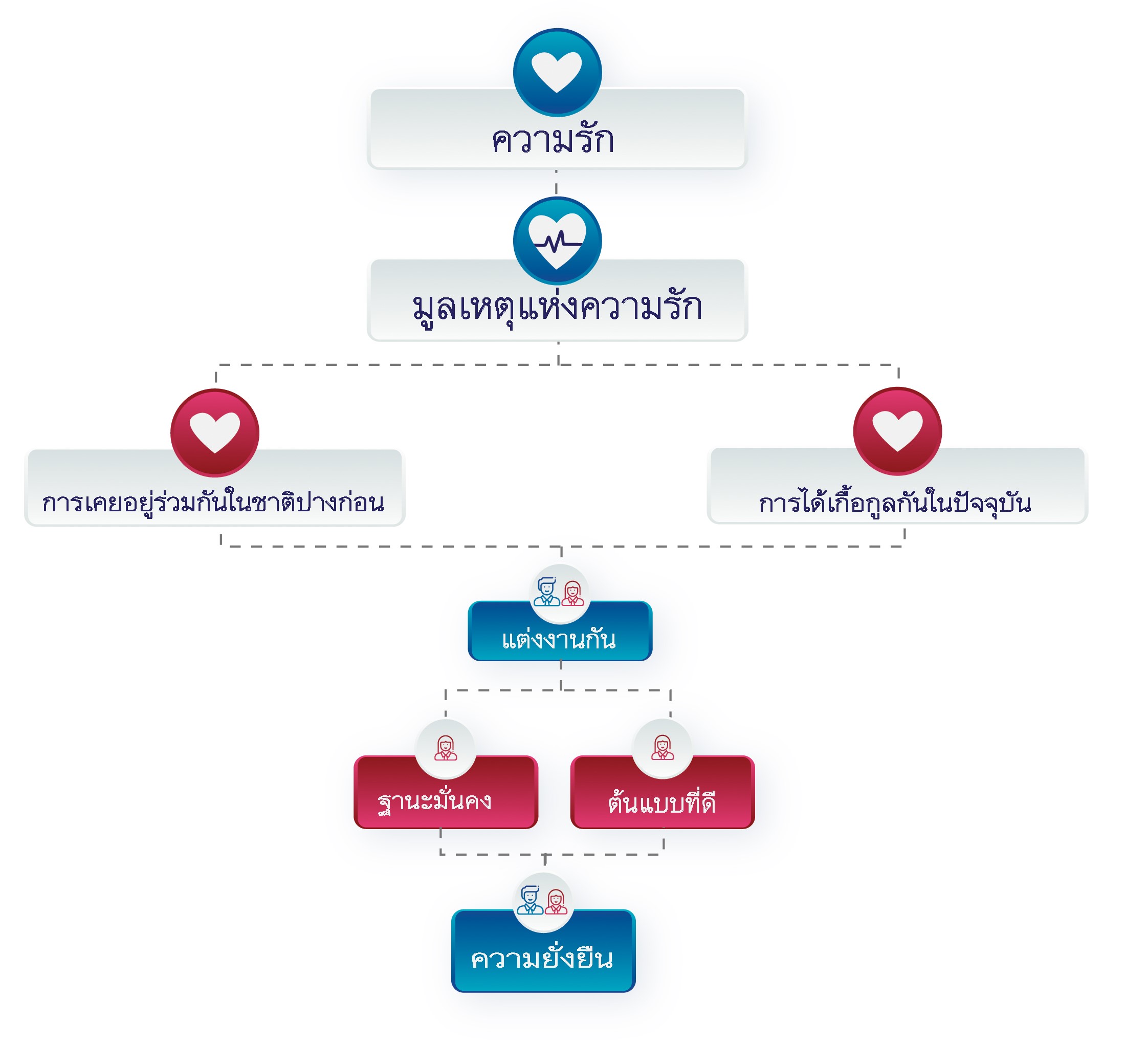The Integration Theravada Buddhist Philosophy to Strengthen the Family of Thai Woman Marrying Foreigners in Roi Et Province
Main Article Content
Abstract
The purposes of this research were 1) to study the concept of strengthening the family, 2) to study the principles of Theravada Buddhist philosophy regarding to strengthening the family, 3) to integrate Theravada Buddhist philosophy to strengthen the families, 4) to present knowledge about Theravada Buddhist philosophy to strengthen the family of Thai women who marry foreigners in Roi Et Province. It is qualitative research. Data were collected from primary and secondary documents and in-depth interviews with 15 peoples. Descriptive analysis was performed using the inductive method.
The research results were as follows:
1. The concept of strengthening the family it is a presentation of the concept that the living together of a married couple with the goal of creating a family with stability in status, and have heirs to carry on the family. Living with honesty. Behave as a good example in five areas: relationships, economics, social, capital, and roles.
2. Theravada Buddhist philosophy regarding strengthening the family includes: 1) the principle of Samjivita (Samsaddha, Samsila, Samcaka, Sampanya), 2) the principle of Kihisuk (Atthisuk, Phoksuk, Ananasuk, and Anavajjasuk), 3) The principle of Bhogavi (1 part for self-sufficiency and benefit, 2 parts for investment, and 1 part kept for use in times of need) 4) Principles of Secular Dhamma (Sajja Dama Khanti Caka).
3. Integrate the four principles of Buddhist philosophy using the following methods: 1) Samjivi Dhamma principle creating the correct vision to develop a strong family. 2) Secular Dhamma principles to strengthen the relationship between married couples; 3) strengthening to the principles of nutrition; 4) strengthening to the management; and 5) strengthening to the principles of happiness; and 6) strengthening to the status of the family.
4. The knowledge gained is the CBB model, which includes C = creating a strong family head, meaning creating a strong family head; B = building strength between people in the family, meaning building strength between people in the family; and B = building and strengthening family status, meaning building and strengthening the family status.
Article Details

This work is licensed under a Creative Commons Attribution-NonCommercial-NoDerivatives 4.0 International License.
เพื่อให้เป็นไปตามกฎหมายลิขสิทธิ์ ผู้นิพนธ์ทุกท่านต้องลงลายมือชื่อในแบบฟอร์มใบมอบลิขสิทธิ์บทความ ให้แก่วารสารฯ พร้อมกับบทความต้นฉบับที่ได้แก้ไขครั้งสุดท้าย นอกจากนี้ ผู้นิพนธ์ทุกท่านต้องยืนยันว่าบทความ ต้นฉบับที่ส่งมาตีพิมพ์นั้น ได้ส่งมาตีพิมพ์เฉพาะในวารสาร วิชาการธรรม ทรรศน์ เพียงแห่งเดียวเท่านั้น หากมีการใช้ ภาพหรือตารางของผู้นิพนธ์อื่นที่ปรากฏในสิ่งตีพิมพ์อื่นมาแล้ว ผู้นิพนธ์ต้องขออนุญาตเจ้าของลิขสิทธิ์ก่อน พร้อมทั้ง แสดงหนังสือที่ได้รับการยินยอมต่อบรรณาธิการ ก่อนที่บทความจะได้รับการตีพิมพ์References
กัลปพฤกษ์ ผิวทองงาม และวิไลวรรณ มหาวีรวัฒน์. (2549). ผลกระทบที่เกิดจากการใช้จ่ายของกลุ่มคู่สมรสชาวต่างชาติที่เดินทางเข้ามาท่องเที่ยวหรือตั้งถิ่นฐานในเขตภาคตะวันออกเฉียงเหนือต่อรายได้และการจ้างงานของภาคตะวันออกเฉียงเหนือ โดยใช้แบบจำลองปัจจัยการผลิต-ผลผลิตของภาค. (รายงานการวิจัย). ขอนแก่น: ศูนย์วิจัยเศรษฐกิจและธุรกิจอีสาน คณะวิทยาการจัดการ มหาวิทยาลัยขอนแก่น.
งามตา วนินทานนท์. (2545). การวิเคราะห์ดัชนีเชิงเหตุและผลของคุณภาพชีวิตสมรสในครอบครัวไทย. กรุงเทพฯ: สำนักงานคณะกรรมการการวิจัยแห่งชาติ.
ณภัสสรส์ เหมาะประสิทธิ์. (2560). องค์ประกอบและเกณฑ์ชี้วัดพฤติกรรมเชิงพุทธของครอบครัวในสังคมไทย. (รายงานการวิจัย). พระนครศรีอยุธยา: สถาบันวิจัยพุทธศาสตร์ มหาวิทยาลัยมหาจุฬาลงกรณราชวิทยาลัย.
บุญมี แท่นแก้ว. (2546). ความจริงของชีวิต. กรุงเทพฯ: โอเดียนสโตร์.
พระเทพวิสุทธิเมธี (ปัญญานันทภิกขุ). (2535). หน้าที่ของคนฉบับสมบูรณ์ (คนดีและคุณสมบัติพิเศษของนักบริหาร). กรุงเทพฯ: ธรรมสภา.
พระมหาเผื่อน กิตฺติโสภโณ และคณะ. (2560). โมเดลความสัมพันธ์เชิงสาเหตุของครอบครัวเข้มแข็งในสังคมไทย. (รายงานการวิจัย). พระนครศรีอยุธยา: สถาบันวิจัยพุทธศาสตร์ มหาวิทยาลัยมหาจุฬาลงกรณราชวิทยาลัย.
พระอธิการสนอง ปภสฺสโร (คณะพรหม). (2556). การประยุกต์หลักพุทธจริยธรรมในการครองเรือนของหญิงไทยพุทธที่แต่งงานกับชาวต่างชาติ ในเขตอำเภอทุ่งเขาหลวง จังหวัดร้อยเอ็ด. (วิทยานิพนธ์พุทธศาสตรมหาบัณฑิต). พระนครศรีอยุธยา: มหาวิทยาลัยมหาจุฬาลงกรณราชวิทยาลัย.
วัฒนะ กัลป์ยาณ์พัฒนกุล และคณะ. (2560). หลักธรรมและหลักการเสริมสร้างความมั่นคงในครอบครัวตามแนวพุทธศาสนา. (รายงานการวิจัย). พระนครศรีอยุธยา: สถาบันวิจัยพุทธศาสตร์ มหาวิทยาลัยมหาจุฬาลงกรณราชวิทยาลัย.
ศิวาพัชร์ ฉัตรเท. (2561). การสร้างสัมพันธภาพในการครองเรือนของคู่สมรสเชิงพุทธ. (วิทยานิพนธ์พุทธศาสตรมหาบัณฑิต). พระนครศรีอยุธยา: มหาวิทยาลัยมหาจุฬาลงกรณราชวิทยาลัย.
โสวิทย์ บำรุงภักดิ์ และพุทธชาติ คำสำโรง. (2554). การวิเคราะห์ทัศนคติการอยู่ก่อนแต่งงานของประชาชน: กรณีศึกษาเทศบาลนครขอนแก่น. ขอนแก่น: มหาวิทยาลัยมหาจุฬาลงกรณราชวิทยาลัย วิทยาเขตขอนแก่น.

